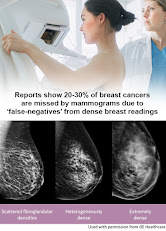NY Cancer Alliance to Launch the First Dense Breast Research Study for Low BMI and Underserved Subjects
1/11/2022- Dr. Noelle Cutter (Biology professor and clinical researcher from Molloy College) joined with Dr. Robert L. Bard (top NYC radiologist and cancer diagnostic expert) to deploy the 2022 field study to provide breast screening to younger women, subjects with LOW BMI and those in underserved areas. "Through supplemental imaging (ie. 3D Doppler Ultrasound), we can provide better detection of tumors in dense breasts that are concealed by dense breast tissue from mammography."
Mammography is the current standard for breast cancer early detection for women 40 & older. Recent studies have shown nearly half of all women who get mammograms are found to have dense breasts, exposing this population to the risk that mammograms may miss potentially cancerous tumors concealed by dense breast tissue. Dr. Cutter's initial concepts to target LOW BMI (bet 12-22% body fat) was personally inspired. As an active TRIATHLETE, her own diagnosis sparked her survey and inquiry throughout the athletic community where she uncovered a significant trend that became the basis for this research. She wishes to target younger women, athletes and members of underserved communities. "Younger women may be more likely to have dense breasts... also I find athletes with LOWER BMI (body mass index) or those with less body fat are more likely to have more dense breast tissue compared with women who are obese."
Breast density is shown to be associated with breast cancer risk in women aged 40 to 65 years, but there is limited evidence thus far of its association with risk of breast cancer among women 18+ (mostly because mammography starts at 35 or 40). Furthermore, a high proportion of women with low BMI present with dense breasts, making them likely candidates to receive false negative readings on a mammogram. "We aimed to estimate the proportion of breast cancers attributable to breast cancer risk factors commonly documented in clinical practice and used in breast cancer risk prediction models, including BI-RADS breast density and ultrasounds to confirm mammography readings", states Dr. Bard.Thanks to the digital (Web-shareable) platform of ultrasound, collaborating between multiple scanning locations allows all data to be collected and interpreted by Dr. Bard in his NYC clinical facility. "This allows us to have more scanning partners throughout the state and hopefully even across the country", says Joe Cappello, national patient advocate of AreYouDense.org.
The national expansion program of this screening pilot and remote-location training are supported by an expanding list of clinical and technological leaders in diagnostic imaging. "We are honored to join this research and educational crusade to save lives... where Ultrasound Imaging can perform such a vital role in uncovering so many cancer concerns more efficiently", states Alice Chiang, CEO or Terason Inc. The coordinated research team aspires to collect enough data from these demographic target groups (18+, low bmi and underserved women) to support the emphasis of dense breast concerns in our cancer detection community and the importance of supplemental scanning for all early detection facilities.
JOINING THE TEAM TO MAKE A DIFFERENCE As an athlete and medical professional in the field of Physical Therapy, being able to keep as many athletes healthy across the lifespan as possible has always been a major passion of mine. For those women within the endurance athlete community who may have denser breasts could greatly benefit from a well-designed approach to more accurately detect and diagnose the presence of breast cancer. This is especially true for those who are younger than the age of 40 who may already have breast cancer related changes but have never received an appropriate mammogram as well as those over 40 who have received false negatives because of dense breast tissue concealing the breast tumor on mammogram. The use of ultrasound imaging in accordance with mammographic study conducted in our study with Dr. Bard and Dr Cutter, I believe, will be a great asset to the women of Long Island to better detect and help them receive early treatment should breast cancer be present. I am honored to be included in this study to not only help the women of Long Island and abroad within the endurance athlete community but also those in underserved communities to ensure they get to continue to do the things they love with those they love most. |



